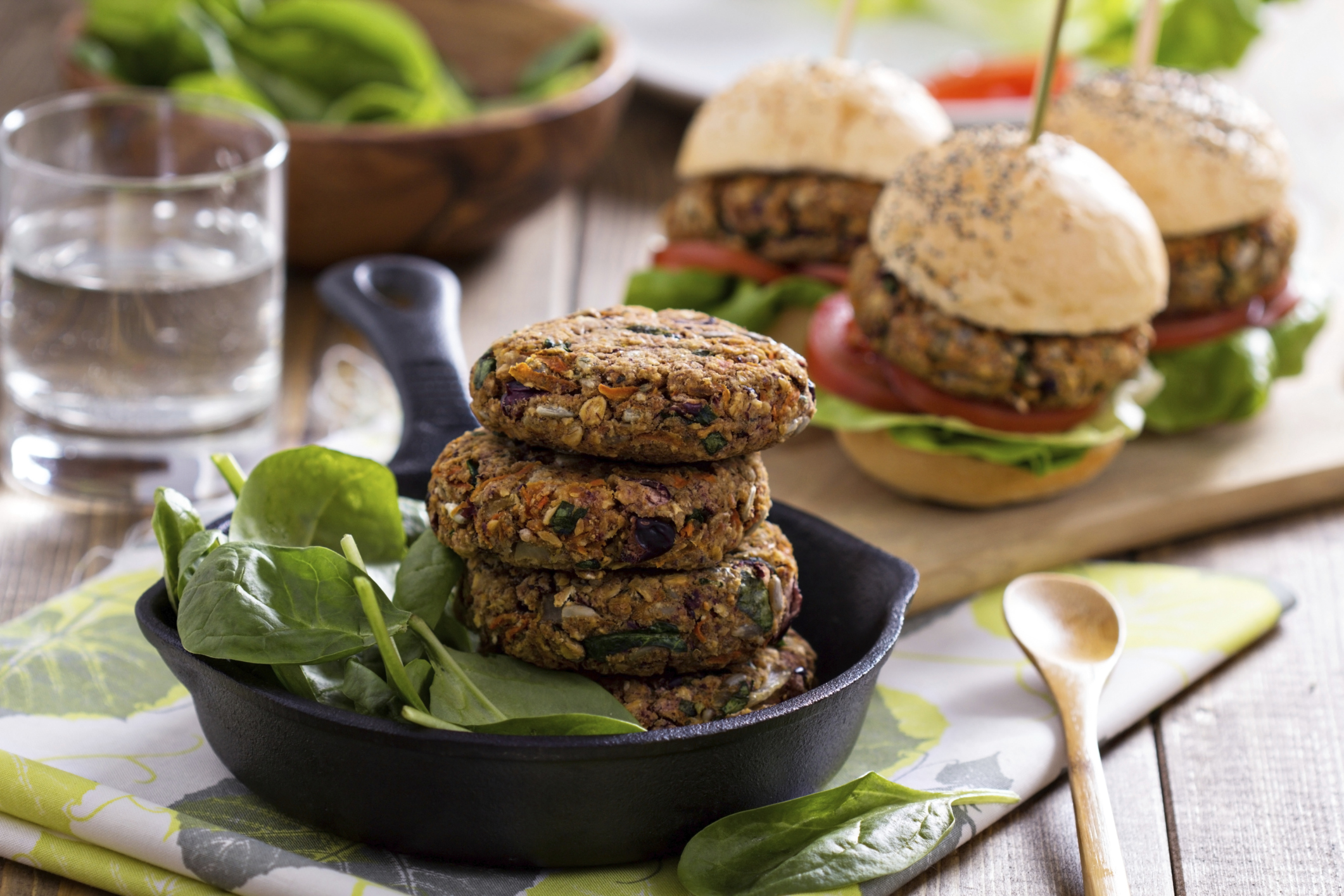
Vegan & Vegetarian Diets for Athletes
Track and field champion Carl Lewis. Heavyweight boxer Cam Awesome. Bodybuilder Jehina Malik. Ultra-marathoner Scott Jurek.
These four are all amazing athletes, but they have another similarity: They’re all vegan.
Whether it is for health, environmental, or ethical reasons, following a plant-based diet is becoming increasingly prevalent. And as the prevalence increases in the general population, it is also becoming more common for athletes to follow vegan diets.
Can a plant-based diet meet the nutritional needs of an athlete? The position statement of the Academy of Nutrition and Dietetics states: “To train and perform optimally, athletes of all levels — from recreational to elite — should consume a diet comprised of wholesome foods high in carbohydrate, low to moderate in fat, and adequate in protein, vitamins, minerals, and fluid. A vegetarian diet easily meets these needs and offers additional health and performance advantages.”
For all athletes, adequate caloric intake is required to provide energy for cells and muscles. Because athletes are burning more energy, they will need to consume more calories to maintain energy balance. Eating enough total calories will allow the body to use the protein that you consume to build muscle instead of using it as a source of energy. Calorie needs will vary based on gender, body size/composition, age, and activity level.
Calories come from the macronutrients we eat (carbohydrates, fats, protein). Because a vegetarian diet is typically high in carbohydrates and low in fat, it is well suited to meeting the needs of the athlete. Make sure to eat a wide variety of foods and a wide variety of different colors of fruits and vegetables each day to ensure you are getting a variety of nutrients.
Carbs should come from a variety of sources including whole grains such as brown rice, fruits, vegetables, and legumes. These complex carbs provide fiber, protein, vitamins and minerals, and antioxidants that can help to protect the body from the stress of exercise. It is important that athletes eat post-workout (between 30 minutes to 2 hours) to replenish muscle and liver glycogen stores. A piece of fruit, fruit juice, or a fluid replacement beverage makes a good post-workout snack, followed by eating a mixed high carbohydrate and protein meal (examples include pasta with lentil spaghetti sauce, tofu with vegetables and rice, or a mini bean burrito).
One of the most frequent questions asked of vegans, especially vegan athletes, is how they get enough protein. Adequate protein intake is needed for the maintenance and growth of cells, organs, muscles, and for the immune system. An inadequate intake of protein can cause fatigue and loss of muscle mass. Protein requirements for the vegetarian athlete range from 1.3-1.7g/kg, a level that is quite achievable from a plant-based diet. For a 180-pound male, this would be in the range of 105-125g of protein/day.
Proteins are made of chains of amino acids, and in addition to meeting overall protein needs, it is also important to have adequate intake of the individual essential amino acids. Soy (tofu, tempeh, edamame), seitan, lentils, and other legumes all provide good sources of the amino acid lysine, which is generally low in other plant foods. Other sources of protein in the vegan diet include nuts and seeds, whole grains, and vegetables. For example, a breakfast of two cups of oatmeal, a half cup of soymilk, an ounce of almonds, and a slice of wheat toast with peanut butter provides 30 grams of protein.
Fats provide energy, essential fatty acids, and fat soluble vitamins (Vitamins A, E and K). Dietary fats also help the athlete to meet their caloric needs as these are the most calorically dense macronutrient. Saturated fats, which are found mostly in animal products and tropical oils, should be limited as they have been shown to increase risk of cardiovascular disease and stroke. In order to increase your intake of beneficial Omega 3 fatty acids and monounsaturated fats, choose canola, olive, or avocado oils to bake and cook with, and incorporate walnuts, ground flaxseed, and other nuts into your daily diet.
In addition to getting enough calories and protein, there are several micronutrients that require additional attention in the diet of the vegetarian athlete:
Iron: The iron found in plant foods is not as well absorbed as the iron in meat, but it is possible to get enough iron from a well-balanced vegan diet. Iron-rich foods include dark green vegetables such as broccoli, dried fruits, legumes (lentils, dried peas/beans, tofu) and whole and enriched grain products. Cooking with a cast-iron skillet can also increase the iron content of foods. Eating iron-containing foods with foods high in vitamin C improves absorption of iron. Some good ways to increase your iron intake are to have a small glass of orange juice with your morning oatmeal, sprinkle pumpkin seeds on your soup and salads, and combine tomatoes (high in vitamin C) with high iron foods such as beans.
Vitamin B12: Vitamin B12 is involved in the formation of red blood cells, in protein metabolism, and helps to maintain the central nervous system. Sources of B12 in the vegan diet include fortified grain products and nutritional yeast (unless they are fortified, plant foods do not contain vitamin B12). It is recommended for vegetarians and vegans to eat supplemented foods or to take a B12 supplement. The recommended daily amount for B12 is 2.4 mcg/day for those 14-64 years old. The recommended supplementation for vegans is 2-3.5 mcg of B12 twice per day, or 25-100 mcg once per day.
Calcium and Vitamin D: Calcium and vitamin D are both important in maintaining bone health. For adults up to 50 years old, the daily recommended intake for calcium is 1,000 mg and for vitamin D is 600 IU. Vegetarians and vegans should aim for the recommended intake of both. Calcium can be obtained through foods such as calcium-set tofu, fortified orange juice or fortified non-dairy milks, and blackstrap molasses. Leafy greens high in absorbable calcium include kale, mustard greens, bok choy, turnip greens, collard and watercress. Aim to eat at least three servings of these high calcium foods daily. Vitamin D sources are limited in the vegan diet, so especially in areas with limited sunlight, taking a supplement of 600-1000 IU of vitamin D should be considered.
Hopefully this information will be useful to all the vegetarian and vegan athletes out there, and anyone else who is looking for a high-performance diet. Please let me know in the comments if you have questions!
 Charlotte Furman, MS, RD, CD, has experience as a clinical dietitian at the University of Washington Medical Center where she is currently the Technology and Wellness Manager. In her free time Charlotte enjoys spending time outdoors with her family, cooking delicious meals, and playing with her new dog, Scout.
Charlotte Furman, MS, RD, CD, has experience as a clinical dietitian at the University of Washington Medical Center where she is currently the Technology and Wellness Manager. In her free time Charlotte enjoys spending time outdoors with her family, cooking delicious meals, and playing with her new dog, Scout.
This post was originally published in the RD Blog. You can visit the RD Blog and see its archives if you have a UW Medicine ID.
2 Thoughts on “Vegan & Vegetarian Diets for Athletes”
On December 7, 2015 at 8:21 AM, Lucy Zybura said:
Please can I have the recipe for the scrumptious looking vegan burgers in the picture heading the top of this article? Please??
On December 7, 2015 at 9:09 AM, Margaret Murray said:
Hi Lucy, that is actually a stock image. BUT I have been making this recipe for years with great results: http://www.thepeche.com/home/2010/4/26/falafel-burgers-with-harissa-yogurt.html
Comments are closed.